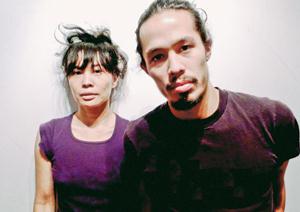For the better part of two decades, musician, filmmaker, actor, artist and broadcaster Sook-Yin Lee has enlightened and enlivened the background noise of our lives. Through her previous work as a MuchMusic VJ, to her current role as the host of CBC radio’s superlative DNTO (formerly Definitely Not the Opera), as well as her performances in films such as John Cameron Mitchell’s Shortbus, Lee has been both an entertaining friend and a probing detective of the human condition.
“I do see my role as a broadcaster as an extension of my art practice,” Lee explains, “and I have a lot of questions about people and about myself.” Lee has always striven to bring a sense of vulnerability and intimacy to each of her many creative platforms.
Her prodigious artistic output first coalesced as a way to make sense of her often-tumultuous family life. “I have a mom who was constantly wrestling with mental illness,” she says, “and my family ended up exploding.” Lee discovered that through mining the depths of her pain she could turn trauma into transformation. “I remember turning to art and expression as a method of escape and also of solace and self-expression,” she says.
Although Lee’s previous performance endeavours have included many mediums, her experience with theatre has thus far been limited to performing as a hermaphrodite Mephistopheles in a West Coast adaptation of Goethe’s Faust. Her return to the stage was brought about by another attempt to exorcise pain through the creative act. After moving to Vancouver to support her sister, who had recently been diagnosed with cancer, Lee spent the summer in Winnipeg incarnating Olivia Chow in the CBC film Smilin’ Jack: The Jack Layton Story. Embodying Chow at the time of her husband’s death took a toll, and Lee found herself “reeling from a year of discombobulation . . . I came back from Winnipeg very confused and kind of shell-shocked.”
It was at this time that Laura Nanni — director of the Rhubarb Festival at Buddies in Bad Times Theatre — approached Lee about creating a piece for inclusion in this year’s programming. Again, Lee’s personal turmoil served as the fulcrum for an exciting artistic exploration. “It made me think about memory and the process of remembering and forgetting, and why it is that we so easily forget some things that we ought to remember and why we retain things that we really wish to forget.”
After deciding to create a work for Rhubarb, Lee attended plays in many theatres across the GTA. Finding much of the traditional, narrative-based work on offer elitist, financially inaccessible and not reflective of the city’s dynamic multiculturalism, Lee reached out to the dance community for a collaborator to help her create an interdisciplinary performance work inspired by memory. After connecting with dancer and performance artist Benjamin Kamino — Lee describes her first meeting with Kamino as “like meeting my brother” — the two began a residency at hub14, a Queen Street West artist-run studio space. The result of this artistic experimentation is How Can I Forget?, which is being presented as part of Rhubarb on Feb 22 and 23.
The multimedia work, which Lee describes as a “duet” performed by herself and Kamino, creates intersections between prose, poetry, movement, dance, filmmaking and performance art. After recently working in film, her excitement about returning to theatre lies in the medium’s innately ephemeral qualities and also in its occasionally messy, but always uniquely human, parameters: the electricity of the flubbed line, the bruised body and the occasional jet of wanton spittle propelled by an especially enthusiastic exclamation. How Can I Forget? exemplifies many of the recurring themes of Lee’s art practice by actively engaging with these special, intimate, vulnerable aspects of live performance.
The unifying factor in her myriad creative activities is a curiosity about the many facets of her fellow humans. “I feel a need to communicate,” she says. “It’s rejuvenating for me, and it brings me a lot of joy . . . I try to bring it back to an intimate place.”
With How Do I Forget? Lee continues to turn tragedy into catharsis for herself and her loyal audience; as WH Auden eloquently wrote in his poem “In Memory of WB Yeats,” “Follow, poet, follow right/To the bottom of the night/With your unconstraining voice/Still persuade us to rejoice.”

 Why you can trust Xtra
Why you can trust Xtra


